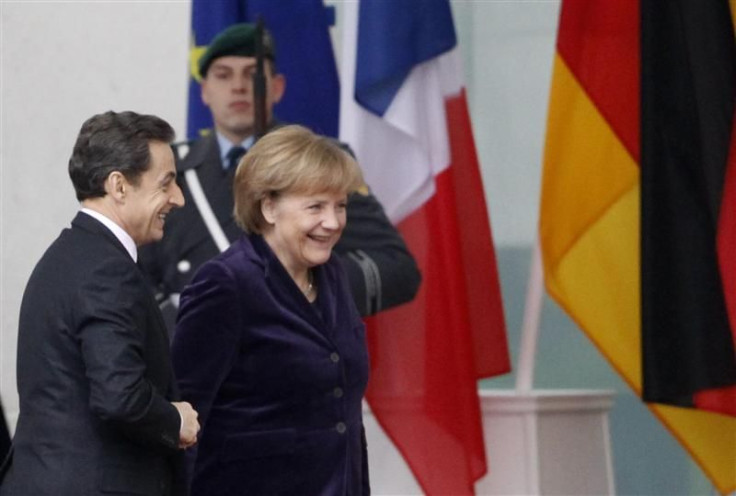Merkel, Sarkozy Press for Quick Greek Solution

(REUTERS) -- Germany and France warned Greece on Monday it will get no more bailout funds until it agrees with creditor banks on a bond swap and pressed for an early deal to avert a potential default in the Eurozone's most debt-stricken nation.
Chancellor Angela Merkel and President Nicolas Sarkozy, the Eurozone's two leading powers, insisted after talks in Berlin that private sector bondholders must share in reducing Greece's debt burden, along with new European and IMF lending.
They rejected both a call by a European Central Bank policymaker to abandon plans to make private investors take losses, and a leaked International Monetary Fund memo that cast doubt on Athens' ability to reform its public finances.
We must see progress on the voluntary restructuring of Greek debt, Merkel told a joint news conference. From our point of view, the second Greek aid package including this restructuring must be in place quickly. Otherwise it won't be possible to pay out the next tranche for Greece.
Merkel and Sarkozy both voiced their determination to press ahead with a tax on financial transactions opposed by Britain, but they appeared to diverge on the timing.
Sarkozy, facing a strong left-wing challenge in his struggle for re-election in May, suggested France could go it alone and challenge other states to follow suit.
Merkel said all 27 EU finance ministers should report in March, and the 17-nation euro zone should move ahead if other countries continued to block an EU decision. But she acknowledged that she did not have full agreement on this within her centre-right coalition government.
A Greek government official said talks with private bondholders on a debt swap key to averting default were progressing but there was no deal yet. However, a senior insurance executive briefed on the negotiations said they were very difficult and likely to be unsuccessful.
The executive, who is not directly at the table, said roadblocks included whether a debt writedown would trigger credit default insurance or not, and how a sufficient number of creditors could be corralled into joining an agreement.
The only hedge fund on the steering committee representing private creditors, Madrid-based Vega Asset Management, walked out last month. French bank BNP Paribas , which has a strong interest in a deal given its large exposure to south European sovereign debt, said last week that agreement was near, but other banking sources are more skeptical.
Merkel's tough comments highlighted growing concern among European governments that a potential collapse of the Greek rescue negotiations poses the most immediate threat of destabilizing the entire 17-nation euro currency and the global economy.
FISCAL PACT
On other issues, Merkel and Sarkozy said they aimed to wrap up negotiations among euro zone countries this month on a new fiscal pact tightening budget discipline, to be signed at the latest on March 1. The latest draft would give more power to the executive European Commission to reject national budget plans that deviate from agreed EU targets.
Eurozone states agreed last month to press ahead with an agreement outside the EU treaty after Britain vetoed plans to amend it to allow stricter enforcement of deficit limits.
The German and French leaders also agreed to ask the ECB to recommend how the euro zone's rescue fund, the European Financial Stability Facility, could be made most effective.
Berlin has so far opposed calls from Paris and elsewhere to increase the size of the 440 billion euro EFSF, but it might be politically easier to relent in response to an ECB call.
Greek Prime Minister Lucas Papademos said last week that Athens risked an uncontrolled default in late March unless it agrees a new aid package with the so-called troika of the euro zone, the ECB and the IMF by then.
An internal IMF memo, quoted by the German magazine Der Spiegel on Saturday, said the freefall of the Greek economy has made international lenders' plans to rescue Greece obsolete, threatening the debt sustainability of the embattled euro member state.
Merkel said she wanted Greece to stay in the euro zone, and a private sector debt writedown was a necessary but not sufficient precondition to get Greece back onto an acceptable path.
Greece should get a chance but Greece remains a special case, she said, adding that Athens must commit to further economic reforms.
ECB Governing Council member Athanasios Orphanides wrote in Friday's Financial Times that dropping plans to force losses on investors would help restore trust in the euro zone and lower the borrowing costs of other governments in the currency area.
It was not clear if he was expressing a personal view or speaking for the central bank. Former ECB president Jean-Claude Trichet long opposed private sector involvement in debt relief, only reluctantly accepting a voluntary bond swap last July.
A perceived risk of writedowns on other euro zone government bonds has spooked investors and been one major factor in raising borrowing costs for other southern European states.
Spain and Italy have to issue hundreds of billions of euros in bonds in 2012 starting this week to roll over maturing debt.
The risk premium on Spanish and Italian bonds over safe-haven German 10-year Bunds narrowed slightly on Monday, and the ECB disclosed that it had kept a tight rein on its purchases of government debt in the first week of the new year, spending just 1.1 billion euros.
The two-year-old debt crisis has raised doubts about whether the euro zone will survive in its current form, especially in non-euro Britain and the United States.
British Prime Minister David Cameron, an avowed Eurosceptic, said in a television interview he believed the single currency area would most likely hold together but it has to take some pretty decisive steps.
(Additional reporting by Annika Breidthardt in Berlin, Ed Taylor and Philipp Halstrick in Frankfurt, George Georgiopoulos and Ingrid Melander in Athens and; Writing by Paul Taylor, editing by Mike Peacock)
© Copyright Thomson Reuters 2024. All rights reserved.





















